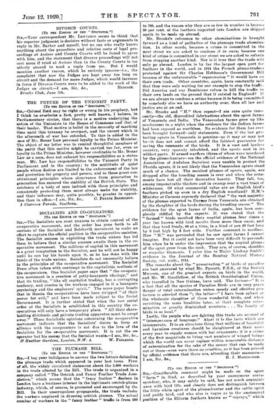THE PLUMAGE BILL.
[To Tax EDITOR or THE "SeitcrAxaa."1 Sur.,—I beg your indulgence to answer the two letters defending the plumage trade which appeared in your last issue. First of ail, the widely circulated statement about the 3.000 workers in the trade affected by the Bill. The trade is organized in a company called "-The Ostrich and Fancy Feather Trade Asso- ciation," which means that the " hussy feather " dealers in London have a business interest in the legitimate ostrich-plume industry, which, of course. is protected and encouraged by the Bill. In their unscrupulous propaganda, the trade includes the workers employed in dressing ostrich plumes. The actual number of workers in the " fancy feather " traffic is from 600
. is 700', and the reason why they are so few in number is because . 80 per cent. of the feathers imported into London are shipped again to be made up abroad.
Mr. Brooks's reference, to other abominations is brought forward as a kind of palliative of the plumage trade abomina- tion. In other words, because a crime is committed in the next street we are asked to condone it in ours.; because one kind of crime is committed in our street we are asked to refrain from stopping another kind. Nor is it tree that the trade will only go abroad. London is by far the largest open port for feathers in the world, and in 1914 the French plume-traders protested against Sir Charles Hothouse's- Government Bill because of the unfavourable " repercussion " it would have on their own trade. Other countries, again, have constantly said that they were only waiting for our example to stop the traffic. Did America and our Dominions refuse to kill the traffic in their own lands on the ground that it existed in England? If we are always to condone a crime because it Is being committed by somebody else we have no authority over, then all law and justice are at an end.
Mr. Brooks and " H." then repeat—I am sure quite inno- cently—the old, discredited fabrications about the egret farms of Venezuela and India. The Venezuelan farms grew up like mushrooms in a night when the evidence for the Indian farms had been exposed as worthless. No evidence for them has ever been brought forward—only statements. Even if the law pro- tecting egrets in Venezuela is genuine—as it may or may not be—it does not and cannot afford the faintest guarantee for saving the- remnants of the birds. It is a vast and lawless country, very sparsely inhabited, and the egrets nest in its wildest parts. If armed warders (three of whom were murdered by the plume-hunters—see the official evidence of the National Association of Audubon Societies) were unable to protect the
Florida egrets; it is not likely that the Venezuelan egrets stand much of a chance. The moulted plumes of egrets, again, are dropped after the breeding season is over and when the-orna- ments have lost all their decorative beauty. They fall, too, among impenetrable thickets and in swamp over a vast tract of wilderness. Of what commercial value are an English bird's feathers picked up even in a dry English woodland? H.M.'s Minister at Caracas expressly declared that " the vast majority of the plumes exported fa Damp. from Venezuela are obtained by the slaughter of the birds during the breeding season." The evidence for the egret farms of India, again, has been com- pletely riddled by the experts. It was stated that the " farmed " birds moulted their nuptial plume' four times a year (no known wild bird moults them more than once), and that they bred freely, 80 at a time, in a kind of pen 20 feet long by ff feet high by 8 feet wide. Further comment is needless. How " H." was persuaded that he saw egret farms I cannot imagine. But it could not have been very difficult to persuade him when he is under the impression that the nuptial plumes of the egret grow from the neck. They are, of course, shoulder or scapular filaments. I refer him to Major Lindsay Smith's evidence in the Journal of the Bombay Natural History Society, vol. xxiii., 1914.
The remarks about the " preservation " of birds of paradise are beet answered by what Mr. Pycroft, F.Z.S., of the British Museum, one of the greatest experts on birds in the world, and Mr. W. Goodfellow, of the British Ornithological Union, who travelled in New Guinea, have said The former—" It is a fact that all the species of Paradise Birds are in very grave danger of total extermination unless speedy and effective pro- tection is afforded them "; the latter—" I have been aghast at the wholesale slaughter of these wonderful birds, and when revisiting the same localities later, at their complete exter- mination or greatly diminished numbers. . . . No family of birds is so local."
Lastly, the people who are fighting this trade are accused of " intemperance of language." Alas I it Is the facts which are intemperate. It is an atrocious thing that millions of beautiful and harmless creatures should be slaughtered at their nests every year to supply women with hat ornaments; it is a crime of the first magnitude to bring vast numbers of winged beings which the world can never replace within measurable distance of extermination for the sake of the money that can be made out of them—even were there no cruelties, as it has been proved by official evidence that there are, attending their maseacre.—






































 Previous page
Previous page